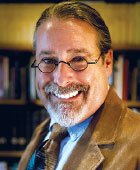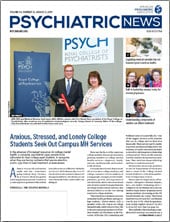About 10 years ago, a restructuring at APA for fiscal reasons led to the sunsetting of dozens of committees including the Committee on Psychotherapy by Psychiatrists. Recognizing that this left APA without any gathering place for psychiatrist-psychotherapists and nobody to advocate for the particular interests of this group, Eric Plakun, M.D., the medical director/CEO of the Austen Riggs Center in Stockbridge, Mass., and a handful of others formed the Caucus on Psychotherapy. Now with a membership of over 500, the caucus has evolved into a lively body concerned with preserving the biopsychosocial identity of psychiatry. In marked contrast to other disciplines, where practitioners of different brands of psychotherapy are often embroiled in internecine conflict, the caucus has achieved a “big-tent philosophy” that finds common cause among the different psychotherapies.
At this year’s APA Annual Meeting in San Francisco, the caucus met to review the state of the caucus, explore current issues of relevance to psychiatrist- psychotherapists, and consider our priorities.
A review of our membership survey revealed the following:
•
We represent every geographic area of APA with the heaviest representation from the Northeast.
•
Nearly half of our members are late-career psychiatrists and a third are established, mid-career psychiatrists.
•
Well over a dozen forms of psychotherapy are represented in the membership, though the majority practice psychodynamic psychiatry.
•
Almost half of the members have solo private practices, with private pay as the most common source of income.
•
More than half are primarily involved in providing combined individual psychotherapy and pharmacotherapy.
•
Almost 20% primarily provide pharmacotherapy but are interested in integrating psychotherapy skills with pharmacotherapy and with preserving psychotherapy as a part of the psychiatric identity.
At this meeting, Margaret Tuttle, M.D., a steering committee member and a psychiatrist at Massachusetts General Hospital, reported on our review of the APA website. The main findings were that APA’s outward-facing content consistently recognizes psychotherapy as an important aspect of the psychiatric skillset, but inward-facing content contained virtually no resources for psychiatrist-psychotherapists.
In the context of recent threats to good clinical care involving psychotherapy—such as in Ontario where the provincial government mounted an effort to limit all psychotherapy to 24 sessions a year (see page 6)—and a perception, even among caucus members, that research was needed to establish the benefits of longer-term treatment, Susan Lazar, M.D., reported on the well-established evidence supporting longer-term treatments including evidence that such treatments lead to cost savings from symptom reduction (
Psychiatric News). She is a clinical professor at George Washington and Georgetown universities and a supervising and training analyst at the Washington Psychoanalytic Institute.
Plakun discussed implications of the recent ruling by the U.S. District Court in the Northern District of California in Wit v. United Behavioral Health, which strongly supported a biopsychosocial approach to treatment and chastised the insurer for a self-serving approach that was overly restricted to symptom reduction and crisis management. Among other things, the ruling by Chief Magistrate Judge Joseph C. Spero affirmed a fiduciary duty on the part of insurers to rely on a multidimensional assessment in making treatment decisions to address, where possible, underlying conditions and not just symptoms; to use lower levels of care only when those lower levels are likely to be just as effective; and to err on the side of caution when the optimal level of care is not clear.
The early career psychiatrist (ECP) members of the caucus’s Steering Committee led a discussion of issues facing ECPs who wish to practice psychotherapy. Anecdotally, most graduating residents are interested in practicing some psychotherapy, but these newly minted psychiatrists commonly face barriers from employers who demand that they “practice at the top of their licenses” and restrict their practice to prescribing.
In discussing the challenges of teaching psychotherapy in residency, especially given the growing body of pharmacologic and neuroscience knowledge that must be mastered, there was a collective concern that many graduating residents may not be equipped to practice psychotherapy. Subspecialization training in psychotherapy was discussed as a possible remedy to training issues and to the general decrease in the practice of psychotherapy in psychiatry.
Subsequently, the caucus leadership decided to direct its advocacy efforts in a number of directions for the coming year. Those include supporting parity and reimbursement for psychosocial aspects of the psychiatric role, emphasizing psychotherapy as part of the identity/brand of psychiatry, enhancing content on the APA website for psychiatrist-psychotherapists, understanding and addressing impediments to psychotherapeutic practice faced by ECPs, exploring the role of the caucus in optimizing psychotherapy training, and increasing the caucus’s membership, given that the influence of the caucus lies in its members and the size of the membership.
Joining is easy. Psychiatrists who are APA members can join directly from their “Member Profile” page on the APA website by clicking on the “specialty interests” tab or by contacting me at
[email protected] or our administrator, Lisa Greiner, at
[email protected]. ■

